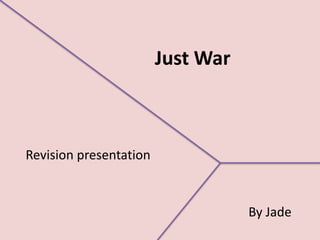
Just war - Religious Studies Revision AS
- 1. Just War Revision presentation By Jade
- 2. What is Just War? A war that is fought for the right reasons, in the right way. Most religious believers accept that war is sometimes ‘necessary’. Peace is the ‘ideal’.
- 4. It is considered wrong to start a war if you do not stand a chance of winning, because war involves the destruction of life and property. Both sides must have a reasonable chance of success. Likelihood of success:
- 5. Proportionality: The force must be proportional to the cause. This was included in the factors to ensure that one side does not use war as a pretext for meting out totally unreasonable force on another country. This clause is important in this time period particularly because now that weapons of mass On the other hand, destruction like nuclear or technological advances biological warfare exist in now make it possible to some countries. The harm they target destruction very are capable of causing is massive and must be precisely – the ‘surgical measured against the gain. strike’.
- 6. None of the Philosophers involved in the Just War theory A just war must be fought relished the idea of war – all with the intention of believed peace was preferable. restoring peace. This clause requires countries to make every attempt to resolve a dispute before considering a armed response. All other non-violent methods must have been tried first. A last resort:
- 7. Controlled Violence: However, all countries participating in the just war, must have This factor was designed the right to defend to protect innocent themselves. civilians. It requires the war to be waged against soldiers and military In addition to civilians, targets. buildings also have to be considered, it would be wrong to bomb a waterworks or a power station for example.
- 8. Fought by the Authorities: It is generally accepted that only the United Nations or the head/government of the country is permitted to declare war.
- 9. Origins of Just war: Discussions on this theory go back to philosophers such as Aristotle and Cicero, who wrote that war in self defence was ‘just’. First significant development of its Both stipulated that war principles came from Ambrose and must only be waged by a his student Augustine of Hippo. legitimate governmental authority, it must be intended to restore peace and justice; it should be a last resort. There are limits on the conduct of war: reprisal killings and massacres were forbidden.
- 10. Just war theory can be divided into 3 parts: Jus in Bello Jus ad Bellum Jus post bellum
- 11. Jus ad Bellum Jus ad Bellum is the just nature of the reasoning and decision to take part in war. These are the rules for the state leaders and there are six requirements, which have been already listed in this presentation: - Just cause - Right intention - Proper authority - Last resort - Proportionality - Probability of success
- 12. Jus in Bello Jus in Bello is the just nature of conduct during the war once it begins. It is the military that effectively bear the brunt of these responsibilities. - Obey all international laws on weapons prohibition(Chemical and biological weapons must not be used). - Discrimination and non-combatant immunity(the military must distinguish between civilian life and legitimate military, political and industrial targets). - Proportionality(Once the end is achieved, no further force is needed) - Benevolence to prisoners (All prisoners are to be given basic rights as they are no longer ‘engaged in harm’). - No means that are mala in se (No methods or weapons that are ‘evil in themselves’ may be used, crimes such as rape, torture, ethnic cleansing, genocide and poison fall into this category). - No reprisals (this includes revenge and retribution).
- 13. Plato & Jus in Bello Great philosopher Plato introduced the idea of not touching those who were not to blame for the conflict, i.e. non-combatants. Today, responsibility for keeping the Jus in Bello rules is mainly that of the military commanders, officers and soldiers. They are accountable for any breaches and may end up being put on trail for war crimes.
- 14. Jus post Bello Jus post Bello is the nature of how a war is ended. This is a relatively new aspect to the just war tradition and is continually being debated. The purpose is to restore peace and arrive at the most effective way of doing this in a controlled manner. Debated principles are: - Restoring human rights. - Distinguishing between innocent civilians, who are to be free from post-war punishment, and those who have incurred penalties. - Public agreement and proclamation - Giving war criminals fair trials: this applies both to leaders and any ordinary soldiers - Establishing financial compensation where necessary but so that civilians are not taxed and that country can restore itself. - Giving the country and its inhabitants the opportunity to reform.